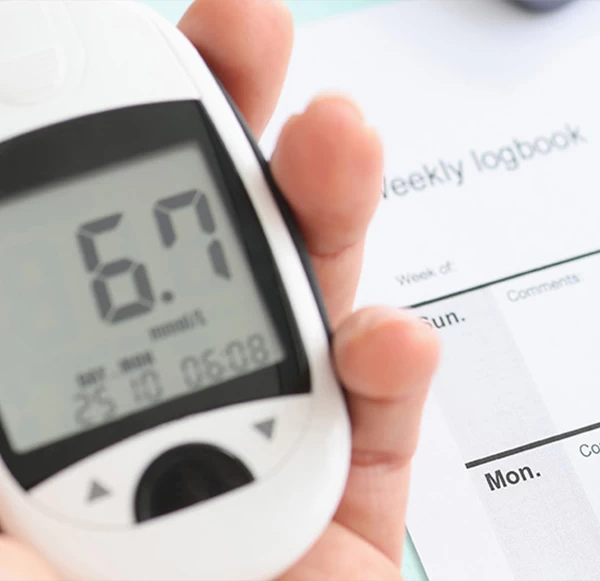- Email Us

India faces a growing health challenge. Over 537 million adults are living with diabetes, and heart disease accounts for one in every three deaths. Many people keep a close watch on sugar levels and cholesterol. Yet, one silent factor often escapes attention: inflammation. The C-reactive protein (CRP) test helps detect this hidden risk early. But what is the CRP test price, and why should you consider it? Read on for answers if you are dealing with heart problems, diabetes, or both.
The CRP test measures the level of a CRP protein that your liver produces when inflammation exists inside your body. It is your body’s natural response to injury, infection, or long-term metabolic stress. A small amount of inflammation helps with healing, but when it stays for too long, it quietly damages blood vessels. The high-sensitivity CRP test detects even low levels of inflammation that ordinary CRP tests may miss. Even minor, continuous inflammation can irritate the inner walls of your arteries—it restricts proper blood flow, eventually affecting the oxygen and nutrient transportation.
People with diabetes often experience continuous internal stress caused by fluctuating blood sugar levels. Every sugar spike triggers chemical reactions that irritate artery walls. The body responds by producing more CRP to fight this irritation. Over time, that inflammation:
Weakens vessel walls, making them rough instead of smooth
Encourages plaque build-up, a mix of cholesterol, fats, and immune cells
Reduces blood flow, forcing the heart to work harder
Raises clotting tendency, which can lead to a heart attack or stroke
The CRP test works best when seen along with other blood tests like the postprandial (PP) test and HbA1c blood test. Each of these tests reveals a different part of the same story.
Test Name | What It Checks | Why It Matters with CRP |
PP Test | Blood sugar after a meal | High PP sugar often leads to inflammation, which CRP reflects |
HbA1c Test | Average sugar level over two to three months | Poor long-term control increases vascular stress and raises CRP |
CRP Test | Inflammation in the body | Links sugar imbalance with hidden vessel damage |
A person may have good HbA1c and PP sugar levels but still show high CRP. That means the arteries may still be under stress from other factors such as obesity, fatty liver, or high blood pressure.
Many people believe that if their sugar levels are stable, they are safe from heart issues. That is not always true. Inflammation can still exist even when glucose appears under control. The CRP test brings this hidden risk to light.
A high CRP means your body is fighting internal inflammation. This can signal a higher chance of heart attack, stroke, or other complications.
A low CRP means your inflammation is under control. It reflects better blood vessel health.
Doctors use CRP results to decide how closely they need to monitor a patient. It helps them identify who needs stronger preventive care or lifestyle support.
Yes. The CRP test helps doctors and patients act early. It serves as an early alarm that your arteries are under stress, even before symptoms appear. It does not confirm heart disease, but it warns when the body is at risk.
Doctors rely on CRP to:
Identify the risk of heart disease in diabetic or prediabetic patients
Track progress after treatment or lifestyle changes
Adjust medicines if inflammation remains high
Guide dietary and exercise plans to reduce long-term complications
A rise or fall in CRP levels shows how your body is responding to care. If CRP drops after better sugar control, it means inflammation has calmed down and your risk has reduced.
There is no fixed rule for everyone. Frequency depends on your health condition and your doctor’s advice.
A baseline test is useful when diabetes or high blood pressure is first diagnosed.
If the result shows inflammation, repeat the test every six to twelve months.
You can also test after lifestyle changes or treatment adjustments.
If you develop new symptoms such as chest discomfort or breathlessness, ask for a recheck.
Accurate testing requires quality equipment and careful sample handling. Mahajan Imaging & Labs is known for its advanced technology and trusted pathology services. We offer:
Affordable CRP test price, which is suitable for regular monitoring
Comprehensive test menu that includes CRP, HbA1c, and PP tests
Accurate reporting with quick turnaround time
Home sample collection for added convenience
Multiple centres across Delhi NCR for easy access
The CRP test gives a deeper look into your health beyond sugar and cholesterol numbers. It helps identify silent inflammation that slowly damages your heart and blood vessels. When combined with the PP test and HbA1c blood test, it completes the picture of your metabolic and cardiac risk.
For accurate results, convenient testing, and the most affordable CRP test price, schedule your test with Mahajan Imaging & Labs right away!
What is a CRP test and why is it important?
A CRP (C-reactive protein) test measures the level of CRP in your blood. CRP is a protein made by the liver that increases when there’s inflammation in the body. The test helps doctors detect infections, monitor chronic conditions, or assess the risk of heart disease. It’s a simple but powerful way to understand what’s happening inside your body.
Why should people with diabetes take a CRP test?
People with diabetes are more likely to develop inflammation-related issues, including heart problems. A CRP test helps track this hidden inflammation, which often doesn’t show obvious symptoms. Regular testing can help manage risks early, guide treatment decisions, and support better overall health management for those living with diabetes.
What’s considered a normal CRP level?
For most healthy individuals, a CRP level below 10 mg/L is considered normal. Levels above that may suggest inflammation or infection. However, for assessing heart disease risk, even smaller changes matter.It’s always best to discuss your results with your doctor for proper interpretation.




